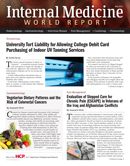Blood Clot Risk with Oral Contraceptives
The risk for blood clots may increase when taking newer oral contraceptives, according to findings published in BMJ.

Newer combined oral contraceptives may increase the risk of blood clots compared to older versions of the pills, according to research published in the journal BMJ.
Researchers from the Division of Primary Care from University Park in Nottingham studied general practices across the UK contributing to the Clinical Practice Research Datalink (CPRD) (618 practices) and QResearch primary care database (722 practices) in order to investigate the association between use of combined oral contraceptives and risk of venous thromboembolism, taking the type of progestogen into account. The participants were women aged 15 to 49 years who had a first diagnosis of venous thromboembolism between 2001 and 2013. The researchers collected data about smoking status, alcohol consumption, ethnic group, body mass index, comorbidities, and other contraceptive drugs. The participants were then matched with as many as 5 controls by age, practice, and calendar year.
The researchers identified 5,062 cases of venous thromboembolism from CPRD and an additional 5,500 from QResearch. The researchers associated an exposure to any combined oral contraceptive was linked to an increased risk of venous thromboembolism, compared to no exposure in the prior year to the analysis. There was a corresponding risk associated with current exposure to desogestrel, gestodene, drospirenone, and cyproterone. Those drugs were significantly higher than those for second-generation contraceptives, considered to be levonorgestrel, norethisterone, and norgestimate.
The researchers added that the number of extra cases of venous thromboembolism per year per 100,000 treated women was the lowest for those taking levonorgestrel and norgestimate. The extra cases of venous thromboembolism per year per 100,000 treated women were the highest for desogestrel and cyproterone.
“In these population based, case control studies using two large primary care databases, risks of venous thromboembolism associated with combined oral contraceptives were, with the exception of norgestimate, higher for newer drug preparations than for second generation drugs,” the authors concluded.
In an accompanying editorial, epidemiology professor Susan S. Jick, DSc, from the Boston University School of Public Health wrote that this study “addresses important questions about the risk of venous thromboembolism in women taking oral contraceptives, concluding that the risk associated with newer pills is around twofold higher than the risk associated with older contraceptives.”
Jick also noted that the risk did not appear to be materially higher for new users of oral contraceptives, though the risk varied according to the case definition of venous thromboembolism. Jick also cited a prior study in combination with this most recent one to conclude the inconsistencies in guidelines for oral contraceptive prescriptions had been clarified.
